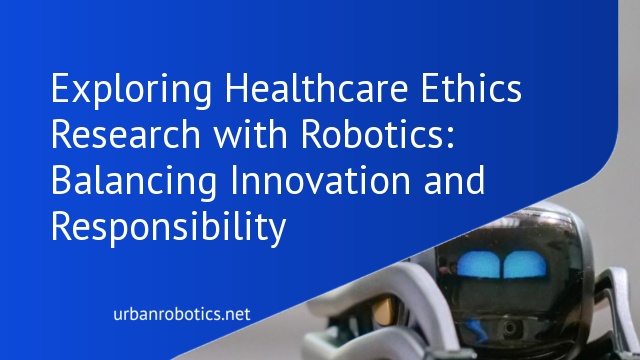Understanding Healthcare Ethics in Robotics
Healthcare ethics in robotics focuses on ensuring that the integration of robots into healthcare settings adheres to established moral principles. This encompasses patient autonomy, beneficence, non-maleficence, and justice. Patient autonomy involves respecting individuals’ rights to make informed decisions about their care, even when using robotic systems for treatment or diagnosis.
Beneficence refers to promoting the well-being of patients while incorporating robotics, meaning that these technologies should actively improve patient outcomes. Non-maleficence ensures that robotic interventions do no harm and that safety protocols are rigorous and constantly updated. Justice demands that all patients have equitable access to robotic-assisted healthcare, avoiding disparities based on socioeconomic status or geographic location.
Healthcare ethics also evaluates data privacy issues. For instance, robust protections must be in place when AI systems handle sensitive health data to prevent breaches and misuse. Additionally, the shift toward robotic roles requires careful consideration of the human element in healthcare, maintaining the empathy and compassion central to the doctor-patient relationship.
The combination of robotics and healthcare ethics research addresses these multifaceted challenges, ensuring that innovations enhance patient care while safeguarding ethical standards. By doing so, we can navigate the complexities of advancing healthcare technology responsibly.
The Role of Robotics in Modern Healthcare
Robotics plays an essential role in transforming modern healthcare. Ongoing advancements streamline medical procedures, elevate diagnostics, and improve patient outcomes.
Advancements and Innovations
Significant advancements in robotics include surgical robots, AI diagnostics, and robotic prosthetics. Surgical robots like the Da Vinci Surgical System enable precise, minimally invasive surgeries. AI-driven machines analyze vast data sets to enhance diagnostic accuracy. Robotic prosthetics, using sensors and AI, offer improved mobility and functionality. These innovations revolutionize patient care and treatment methods.
Current Applications
Robotics currently assists in various healthcare applications. Robotic surgery performs intricate procedures with high precision. Automated systems in hospitals manage routine tasks like medication dispensing, thus reducing errors. Rehabilitation robots support patients’ physical therapy, facilitating quicker recoveries. Additionally, telepresence robots enable remote consultations, expanding access to healthcare. These applications highlight the versatility and impact of robotics in healthcare settings.
Ethical Considerations in Healthcare Robotics
Healthcare robotics raise important ethical questions. As we integrate technological innovations, addressing these ethical considerations is crucial for maintaining trust and efficacy in patient care.
Patient Autonomy
Patient autonomy in healthcare robotics involves ensuring patients make informed decisions regarding their treatment. We must provide complete transparency about how robotic systems operate, including their limitations. Informed consent is vital, with patients understanding the risks and benefits. For instance, patients undergoing robotic surgery should know how the robot assists the surgeon and any potential complications.
Privacy and Confidentiality
Privacy and confidentiality are critical in healthcare robotics. Robotic systems collect and store sensitive patient data, necessitating robust data protection protocols. We need stringent measures to safeguard data from breaches and misuse. For example, AI-driven diagnostic tools accessing patient records should implement encryption and anonymity to ensure data privacy.
Safety and Reliability
Safety and reliability in healthcare robotics ensure patient well-being. Robotic systems must undergo rigorous testing and validation to minimize errors. We should establish stringent safety standards and regular maintenance schedules. For instance, robotic prosthetics should be tested for durability and functionality to prevent malfunctions during use.
Regulatory and Legal Framework
Navigating the regulatory and legal framework is vital for the integration of robotics in healthcare. It ensures that ethical standards and patient welfare are maintained throughout the adoption of new technologies.
Existing Regulations
Current regulations govern the use of robotics in healthcare through multiple agencies. The FDA (Food and Drug Administration) in the US oversees the approval of medical devices like surgical robots, ensuring they meet safety and efficacy standards. The GDPR (General Data Protection Regulation) in the EU enforces stringent data protection measures to safeguard patient information. These regulations create a foundation, but they often lag behind rapid technological advancements.
Proposed Ethical Guidelines
Proposed ethical guidelines aim to address gaps in existing regulations. They stress the need for transparency in AI algorithms, emphasizing the importance of explainability. Implementing ethical AI frameworks ensures that robots operate within ethical boundaries. Guidelines also propose the establishment of oversight committees to review the ethical implications of new healthcare robotics projects. These measures enhance accountability and promote patient trust in robotic healthcare systems.
Case Studies and Real-world Examples
Exploring real-world cases helps us understand the practical applications and ethical considerations of robotics in healthcare.
Successful Implementations
Robotic surgery has gained wide acceptance, significantly reducing recovery times. For instance, the Da Vinci Surgical System enhances precision in complex procedures. AI diagnostic tools like IBM’s Watson assist in rapid, accurate cancer detection. Robotic prosthetics from companies like Open Bionics improve mobility for amputees. These implementations demonstrate how robotics can enhance patient outcomes and operational efficiency.
Ethical Dilemmas Faced
Despite these successes, ethical dilemmas persist. One key issue is patient autonomy in automated diagnoses, where transparency in AI decisions is crucial. There are also privacy concerns in handling sensitive health data. Another dilemma involves the reliability of robotic systems, as malfunctions could jeopardize patient safety. Addressing these ethical challenges requires robust oversight and continuous ethical evaluation to ensure patient welfare.
Future Directions in Ethical Research
The field of healthcare robotics continues to evolve, presenting new frontiers for ethical research. This section explores emerging technologies and potential ethical challenges in this rapidly growing domain.
Emerging Technologies
Advances in healthcare robotics include robotic caregivers, telemedicine robots, and AI-powered diagnostic assistants. These technologies aim to enhance patient care by providing personalized treatment and improving accessibility. For example, robotic caregivers assist with daily activities for the elderly, while telemedicine robots offer remote consultations in underserved areas. As these innovations become integrated into healthcare systems, the need for robust ethical frameworks intensifies.
Potential Ethical Challenges
Integrating cutting-edge robotics into healthcare raises ethical concerns. Issues such as algorithmic transparency, data privacy, and emotional attachment to robots require scrutiny. For instance, ensuring AI diagnostic tools are transparent about decision-making processes is essential to maintain trust. Additionally, safeguarding patient data against breaches and understanding the psychological impact of human-robot interactions are critical areas for future research. Balancing these ethical considerations with technological advancements will be vital for sustainable healthcare innovation.
Conclusion
Healthcare robotics is revolutionizing patient care with innovations like surgical robots and AI diagnostic tools. As we integrate these technologies, it’s crucial to address ethical considerations such as patient autonomy, data privacy, and safety. Robust ethical frameworks are essential for ensuring patient welfare and maintaining trust. Future advancements like robotic caregivers and telemedicine robots promise to enhance accessibility and care quality, but they also bring new ethical challenges. Balancing these considerations with technological progress is vital for fostering sustainable innovation in healthcare. Let’s continue to prioritize ethical research as we navigate this exciting frontier.





